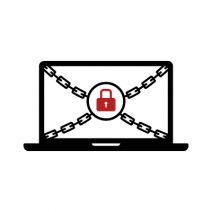Directive Blogs
Let’s have a little fun today. Today’s blog post is written in the format of a daytime soap opera. Please make sure you read all of the dialogue as if being whispered by extremely attractive television stars and starlets!
Life goes on in the small town of Oak Falls, deep woods surrounding the little hamlet nestled on the coast of Cape Seguridad. Let’s follow the lives of some of the residents, their lives Of Vice… and Vulnerability.
Cyberthreats are increasingly sophisticated, and businesses have to do what they can to address these issues. Since cyberattacks can have a massively negative impact on your business, it stands to reason that you need a platform in place to enhance your employees’ awareness of Internet-based threats. This month we look at the top three IT security concerns businesses face and what should be done to confront them.
We’ve spent the last few weeks discussing ransomware's impacts on different subsets. First, we discussed how a ransomware attack impacts the customers of the infected business, and then we touched on the infected business itself. To end, we want to touch on ransomware's impacts on society, specifically regarding economic health and geopolitical security, known as third-order harms.
It can be too easy to look at ransomware as a business problem. After all, it attacks businesses, locking down their data for ransom, often selling it or spreading it, and sometimes altering it for the business if returning it at all. It can be too easy to overlook another impacted target in all the mess.
What happens to the people whose data a business has collected and uses?
Like many of the past few years, this year has witnessed a significant surge in high-profile ransomware attacks. If you haven't already strategized how to safeguard your business from these threats, now is the time to act. Fortunately, you can take several proactive measures to mitigate the impact of ransomware attacks, and it all starts with preparation.
We’re hoping that you are actually reading this post to prepare yourself if your business were to face a ransomware attack, but if you are suffering from one right now, we encourage you to reach out to us immediately, whether you are a client or not. Ransomware spreads quickly, and once it has infected a system, there really isn’t much you can do to stop it. However, there are steps you need to take to come back from this gracefully.
With ransomware becoming one of the single most dangerous threats out there for small businesses, it’s more important than ever to know how to protect your company from its influence. Thankfully, there are measures you can take, including some very powerful ones like zero-trust policies that can thwart attempted ransomware attacks.
I hate to be the bearer of bad news, but when it comes to cybersecurity threats it’s kind of hard not to be. I used to look at it from two sides; one side is fascinated at the innovation and intensely brutal ways that high-end cyberattacks work, and the other side of me loses sleep at night worrying about these risks affecting our clients, prospects, and even my own business. This one particular classification of cyberattack, however, takes the cake for being especially frightening.
You don’t need us to tell you that ransomware is a problem (or maybe you do–we mean, it’s a huge problem). It’s dangerous to both businesses and individuals, and it has become such a common threat that all organizations need to have a plan in place to address it with their staff. Today, we want to highlight a three-part strategy that you can use to approach ransomware in the most secure way possible.
Cybercriminals fight dirty, whether it’s attacking small businesses, large enterprises, or individuals who just want to watch Netflix. It doesn’t matter who you are or what you do for the community; you’ll always be a target for hacking attacks. To save time and effort, hackers will use low-tech attacks and social engineering attacks to target individuals. Hackers aren’t developing new threats all the time; if anything, they largely use existing exploits, purchasable software, and social engineering to take advantage of people.
Ransomware is one of the more dangerous threats out there for businesses of all industries and sizes. To help emphasize just how dangerous it is, however, you have to look past the initial threat of having to pay a ransom and look at the other risks associated with it. We’re here to try to get the point across that ransomware is something your business should absolutely be taking seriously.
Ransomware is such a common occurrence these days that it has entered the public discourse, but we also want to note that it’s such an important topic to discuss with your team that you can never talk about it enough. We want to address some of the most common questions we get asked about ransomware and what can be done about it.
There is a lot made about ransomware, for good reason. It is quite simply one of the nastiest cyberattacks out there and it demands your attention. A lot of people understand what exactly ransomware sets out to do, but they don’t understand how it got that far and how to address the situation if they have the misfortune of being put in that position.
We talk a lot (and we mean a lot) about cybersecurity, with ransomware getting a lot of our focus…and for very good reason. Ransomware is a huge threat that today’s businesses need to be prepared to deal with. In light of this, we wanted to share a few tips to help you avoid the negative ramifications of ransomware.
This past January, the Federal Bureau of Investigation issued an announcement that they had targeted and taken down the servers for a Dark Web organization responsible for the Hive ransomware group. While there is certainly cause for celebration here, one major statistic is enough reason to continue being concerned.
Ransomware is one of the more dangerous threats out there today, and since it is so prominent and dangerous, it is a popular choice amongst hackers. To combat this threat, a community has formed around the cause, encouraging users to not pay the ransom by providing free malware removal tools for the most popular ransomware threats.
Okay, let’s say you’ve been infected by a ransomware attack, and (against our advice) you’ve elected to pay the ransom. That’s the biggest cost that comes with it, right?
Unfortunately, wrong. A ransomware attack comes with a lot more financial impact than just the payment the attacker demands. Let’s go over some of these other costs that can actually outpace that of the ransom.
Let’s begin by making one thing abundantly clear—all businesses and industries could potentially be targeted by ransomware, regardless of their size or target audience. However, as of late, some industries have been targeted more and more. Let’s examine some of the commonly targeted industries that ransomware is frequently waged against.
Ransomware is widely regarded as one of the worst modern cyberthreats out there today, and there's plenty of evidence to support this. These attacks and their aftereffects can devastate businesses of all industries. Let's consider why it is that ransomware is so dangerous, and what can be done to fight it.
Network security could mean any number of things, but more often than not, people are using the term as a blanket statement against the dreaded idea of malware and its many forms. Today, we are discussing how vast the world of malware can be and how often you might find yourself misunderstanding what it exactly is. Knowing all this can help you identify if you have become a malware victim or not.
While it only makes sense to assume that a cybercriminal would focus specifically on those targets that would bring them the greatest profit—in other words, larger businesses—the reality of modern cybercrime renders this assumption grossly outdated. Let’s examine how different developments in ransomware have made it possible for cybercriminals to be far less discerning in who they target.
There’s no way around it; ransomware is bad stuff, plain and simple. The first half of 2021 saw a massive increase in ransomware attacks that made the lives of countless individuals and business professionals difficult. However, a new trend is surfacing, and it’s one that you might be surprised to see: fake ransomware threats.
Did you know that the United States is the leader in ransomware payments? According to a survey from Mimecast titled “The State of Ransomware Readiness,” the U.S. has the highest average payment for ransomware out of the entire world at more than $6 million per victim. These shocking numbers likely stem from high-profile ransomware attacks, but they are also indicative of a larger problem, that being people who still pay the ransom.
Ransomware is such a massive threat that all businesses should be aware of the latest news and findings regarding how it spreads and how it can be prevented. According to a recent report, the latest modes of transporting ransomware have been revealed. What can your organization do to keep ransomware off of its network? Let’s find out.
We often discuss how your business can avoid the impact of ransomware, but what we don’t often discuss is what happens to businesses that do, in fact, suffer from such a devastating attack. We want to use today’s blog as an opportunity to share what your business should (and should not) do in the event of a ransomware attack, as well as measures you can take to avoid suffering from yet another in the future.
Ransomware, ransomware, ransomware. Every day the news reports of a company, a hospital, or even a city getting hit with a cyberattack. It is to the point where it is becoming “background noise”. Unfortunately, many business owners have reached the point where they have begun to tune out the warnings and are lowering their defenses, exposing themselves to risk. Here are 5 misconceptions local businesses have regarding ransomware.
We know, we know; you’re probably sick of seeing ransomware in headlines, and so are we, but we cannot stress enough how important having an awareness of it is for any business owner. A new study has found that businesses infected by ransomware who choose to pay up experience a different type of fallout--one that is a major cause for concern and a stark reminder that there are no guarantees with ransomware. Ever.
Most businesses are aware of the recent rash of ransomware attacks. Attacks have recently shut down gas flow to several states, meat processing plants, and even government agencies such as the MTA. However, what many businesses may not realize is that one thing could have prevented the pain, loss, and disruption from an attack like this: a solid backup solution.
Ransomware has rapidly progressed from an irritating annoyance to a legitimate global threat, with the U.S. Justice Department officially going on the record and establishing that future ransomware investigations will be handled the same way that terrorism cases are now. Let’s review the reasons behind this policy change and how your business should respond.
Last weekend saw a significant cyberattack waged against the world’s largest meat processor and distributor, JBS S.A., that completely suspended the company’s operations in both North America and Australia… and as a result, has impacted the supply chains associated with the company. Let’s examine the situation to see what lessons we can take away from all this.
Headlines have been filled with news pertaining to the recent hack of Colonial Pipeline, which has created significant gasoline shortages up the east coast of the nation. While the pipeline has been restored, the way this was accomplished sets a dangerous precedent. On top of this, the attack seems to have set off bigger infrastructural changes in the political space.
What if I told you that 92 percent of all organizations that are hit by a ransomware attack and agree to settle with the scammers, don’t ever see their data again? You’d probably say that you would never, ever pay and those that do, don’t make sense. Most people keep that stance until their choices are to pay for the data in the hopes of getting it back, or lose it completely. Let’s unpack ransomware and the strategy that hackers most utilize to deploy it: Phishing.
Dangerous cyberthreats don’t just affect major businesses—they are just as likely to hit close to home.
In fact, just two weeks ago, a ransomware attack left half of the computers operated by Chenango County held hostage by hackers, who demanded $90,000 to surrender access to the files. Learn how Chenango County was able to say “No” and recover their data.
For the past several years, ransomware has been a major thorn in the sides of businesses. Hackers that were once known for “hacking” into networks, changed tactics when encryption just got too strong. Today, these “hackers” use confidence tactics to gain access to accounts. Once they’re in, their strongest tool is ransomware. Let’s look at what makes ransomware so dangerous and how your company can combat the constant attacks that come your way.
The growing popularity of ransomware has been disconcerting to many IT professionals, particularly due to the different tactics that this malware variant has been spotted utilizing. In order to protect your business from these attacks, it helps to know how they work. We’ve put together a beginner’s field guide to ransomware types to help you identify (and hopefully avoid) it.
I have a confession to make: it’s actually a pretty trying time to be in the IT business right now. A year ago, the Department of Homeland Security issued a statement for IT and Managed Service Providers (MSPs) about an increased risk of being targeted by cybercriminals.
65 of any currency doesn’t seem like a lot of money, but when you are dealing in the cryptocurrency Bitcoin, it adds up quick. One city on Florida’s Atlantic coast is finding that out the hard way after getting hit with a ransomware that stymied the city of 35,000 government’s ability to function. Let’s take a look at the situation that made the city’s leaders agree to pay hundreds of thousands of dollars to scammers.
Let me ask you a question… let’s say that you’re about one year from your projected retirement, when a ransomware attack encrypts all of your files. What do you do? Pack it in and retire early? This is precisely the situation that the practitioners of Brookside ENT & Hearing Services of Battle Creek, Michigan, have found themselves in - and it may not be over yet.
The funny thing about ransomware is that they give them very strange names: Bad Rabbit sounds like the name of a villainous bunny who gets his comeuppance in some type of modern nursery rhyme, not malware that would ravage hundreds of European businesses. Locky seems like the son of Candado de seguridad, a character Medeco would come up with to educate kids on proper physical security. The latest in a long line of funny-named ransomware, SamSam, isn’t a pet name for your pet ferret you perplexingly named Sam, it is one of the worst ransomware strains ever, and it has caught the attention of U.S. Federal law enforcement.
When it comes to Internet threats, ransomware is the one that causes the most fear, especially for small and medium-sized businesses, as it should. According to the Cisco 2017 Annual Cybersecurity Report, ransomware is growing at a yearly rate of 350%. It’s time to make sure that you’re doing what you can to stop your business from becoming another ransomware statistic. Here’s five very good tips that will help you avoid becoming a victim of the next big ransomware attack!
Society relies on law enforcement to enforce laws in a fair and just manner, but even the police have their work cut out for them when they are targeted by a cyberattack. A recent incident in Cockrell, Texas shows that not even the police are immune to the threats of ransomware--particularly the emerging brand of ransomware, Osiris.
If fiscal reasons have stopped you from securing your network against ransomware thus far, you may want to reconsider your strategy. Not only are attacks still becoming more and more prevalent, but the developers of ransomware have lowered the price of admission for aspiring cyber criminals. Fortunately, there are some steps you can take to keep your business protected against a ransomware attack.
On May 11th, 2017, the world was introduced to the WannaCry ransomware. The ransomware spread around the globe like wildfire, infecting hundreds of thousands of devices and catching many major organizations and businesses by surprise. The full extent of the ransomware’s damage is still being assessed, yet, one thing we do know: this whole fiasco was preventable.
On May 11, 2017, the WannaCry ransomware spread around the globe like wildfire and disabled computing infrastructures belonging to organizations of all shapes and sizes. As the world watched the news unfold, it seemed as if practically no business was immune to this ultra-powerful ransomware. Yet, many quick-thinking organizations were. All because they had the foresight to follow IT best practices.
Ransomware is a tricky piece of malware that locks down the precious files located on a victim’s computer, then (in theory) will return access to them when a ransom has been paid. Depending on the files stored on a victim’s computer, they might simply blow it off and not worry too much about losing access to a couple of pictures or videos--but what if this ransomware threatened to expose your web browsing history?
Students generally love it when classes are cancelled for whatever reason, but thanks to a cybercriminal group called TheDarkOverlord Solutions, a school in Flathead Valley, Montana was disrupted for an extended period of time. This downtime resulted in a disruption of operations for over 30 schools, as well as the threat to the personal information of countless teachers, students, and administrators due to a ransomware attack.
Put yourself in the shoes of a cybercriminal. If you were to launch a ransomware attack, who would be your target? Would you launch an indiscriminate attack to try to snare as many as you could, or would you narrow your focus to be more selective? As it happens, real-life cybercriminals have largely made the shift to targeted, relatively tiny, ransomware attacks.
In 2017, ransomware became a huge threat for businesses, so when discussing how nefarious actors will be leveraging new ransomware streams in 2018, you have to do so with some urgency. Today we will provide some information on ransomware, the current trends, and some trends you have to be very mindful of going forward.
Ransomware doesn’t discriminate with its targets, as the city of Atlanta, Georgia now knows so painfully well. The city became the target of a ransomware attack that crippled many of its critical system workflows. The municipal government suffered from one of the most advanced and sustained attacks in recent memory.
The variety of malware known as ransomware exploded in popularity in 2016, encrypting victims’ files and demanding cryptocurrency payments to restore the data to the estimated tune of $1 billion. This may seem to suggest that large corporations and companies are the primary targets of these cyber criminals--and for some, they are.
Ransomware is a growing problem for businesses, being one of the most difficult threats to remove from an infrastructure. Not only is it easy to spread, but difficult to avoid as a whole. How can your organization prepare for this threat? It starts by being mindful of how ransomware is spread and how your employees react to it, both now and in the future.
We are going to switch things up a bit and walk you through a retelling of a ransomware attack through the eyes of a business owner. Usually when we talk about these types of threats, we approach it from our perspective and talk about what you should do to prepare and what the threats are, but we wanted to try to show you what an event like this could feel like, for you, in your position, and in your own eyes. We hope that this will raise awareness of how crippling an event like this can be on your company, and we hope you let us know if this perspective helps you, your colleagues, and your staff get a more personal sense of what ransomware can do. Enjoy!
 Ransomware is still on the rise, and the Federal Bureau of Investigation has labeled it as one of the biggest dangers to businesses of all kinds. Compared to other methods of spreading malware, ransomware has a unique return on investment that keeps hackers wanting more. One new variant of ransomware uses a phishing attack that’s tailored to your real-world address, which is exceptionally concerning for victims.
Ransomware is still on the rise, and the Federal Bureau of Investigation has labeled it as one of the biggest dangers to businesses of all kinds. Compared to other methods of spreading malware, ransomware has a unique return on investment that keeps hackers wanting more. One new variant of ransomware uses a phishing attack that’s tailored to your real-world address, which is exceptionally concerning for victims.
 Ransomware is such a popular method of attack used by hackers that new variants of it pop up every few months. Among these is Petya, a nasty new ransomware that masquerades as an unsolicited resume in an organization’s email inbox. Don’t be fooled, though; the only work these hackers are looking for is to work you out of a couple hundred dollars.
Ransomware is such a popular method of attack used by hackers that new variants of it pop up every few months. Among these is Petya, a nasty new ransomware that masquerades as an unsolicited resume in an organization’s email inbox. Don’t be fooled, though; the only work these hackers are looking for is to work you out of a couple hundred dollars.
 Ransomware has been spreading like wildfire over the past few years, but up until very recently, Mac users were spared from this troubling development. Now, security researchers at Palo Alto Networks have discovered what they believe to be the first instance of completed ransomware on an Apple device. As this threat is “in the wild,” Mac users should be wary of it and see it as a potential threat.
Ransomware has been spreading like wildfire over the past few years, but up until very recently, Mac users were spared from this troubling development. Now, security researchers at Palo Alto Networks have discovered what they believe to be the first instance of completed ransomware on an Apple device. As this threat is “in the wild,” Mac users should be wary of it and see it as a potential threat.
 Ransomware is one of the most devastating computer viruses in today’s computing landscape. You may have heard of one of its most famous variations, Cryptolocker. It received a lot of attention when it dramatically hit the scene two short years ago. Thankfully, the threat from CryptoLocker has decreased after the GameOver Zeus botnet was taken down last year. Although, now we’ve got a new, more contagious strain of this ransomware to deal with known as Cryptowall.
Ransomware is one of the most devastating computer viruses in today’s computing landscape. You may have heard of one of its most famous variations, Cryptolocker. It received a lot of attention when it dramatically hit the scene two short years ago. Thankfully, the threat from CryptoLocker has decreased after the GameOver Zeus botnet was taken down last year. Although, now we’ve got a new, more contagious strain of this ransomware to deal with known as Cryptowall.
 There are many types of malware out there, but few are as scary as ransomware. Imagine being struck by a threat that instantaneously locks down your files and keeps you from accessing them until you pay a certain amount of money. If your business is targeted by ransomware, would you be able to protect it from dragging your operations into a bitter pit of despair?
There are many types of malware out there, but few are as scary as ransomware. Imagine being struck by a threat that instantaneously locks down your files and keeps you from accessing them until you pay a certain amount of money. If your business is targeted by ransomware, would you be able to protect it from dragging your operations into a bitter pit of despair?

